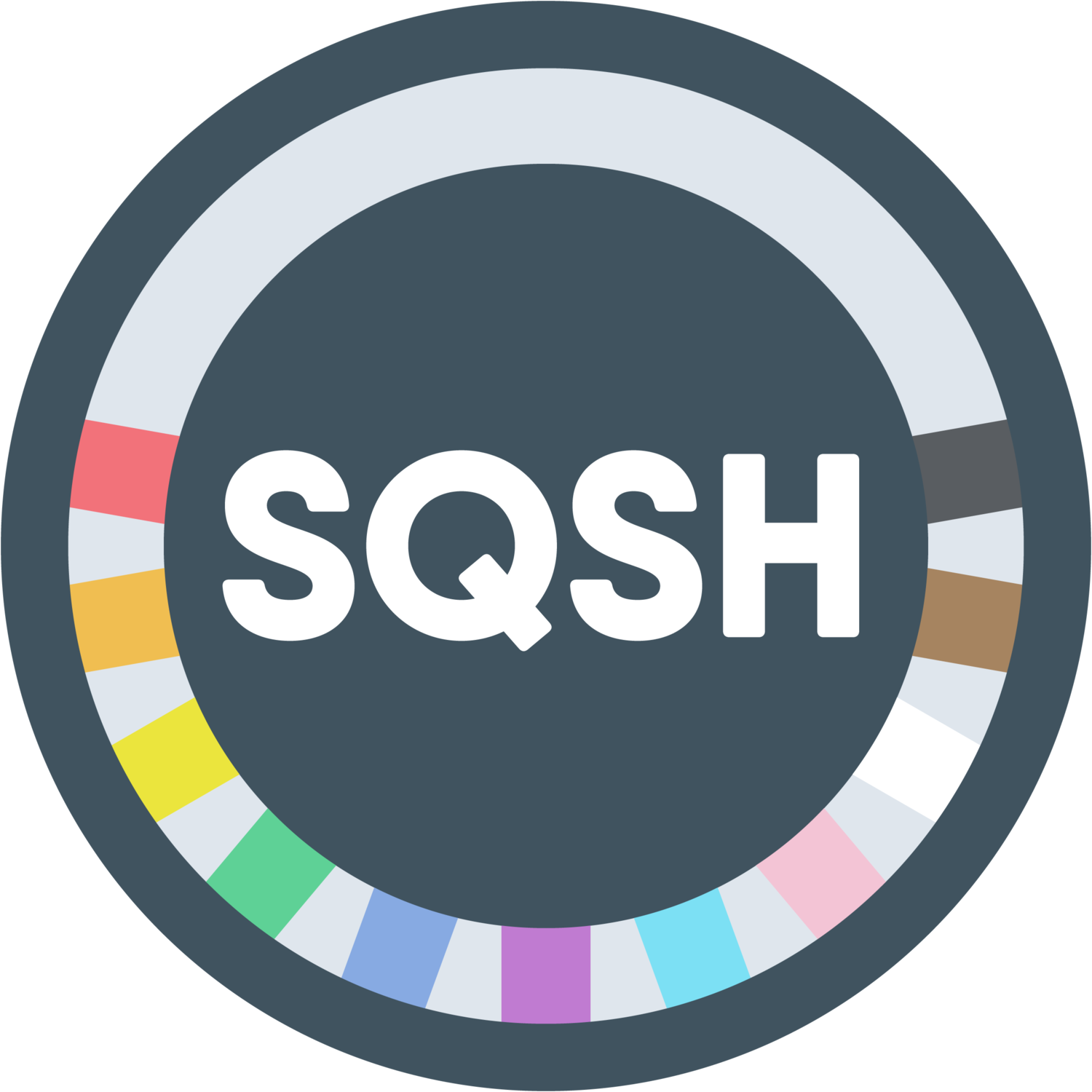
Our Mission
We founded SQSH on the belief that every LGBTQIA+ person deserves to be treated with compassion and dignity – because queer spirits, bodies, and narratives are inherently sacred and indisposable.
Who We Are: SQSH is a grassroots community-based collective of queer and trans St. Louisans. We are organizers, activists, facilitators, educators, community-builders, creatives, healers, and peer counselors. Our teams are a mix of staff, volunteers, and contractors who collaborate to run our programs, operations, and strategy.
Our Vision: We dream of a liberated St. Louis Metro Area where people of all genders and sexualities live with power, safety, and abundance. Read more about our queer liberation dreams here!
Our Mission: Our mission is to build community capacity for queer St. Louisans to thrive by radically reimagining our systems of support & healing. We do this work through…
Non-hierarchical peer support and community-building
Connections with identity-affirming resources and healing spaces
Embodied analysis of oppressive systems that impact our community
Moving systems closer towards liberatory values
Education and advocacy to uplift queer St. Louisan stories

Meet Our Co-Founder
“I’m a trans-masculine, genderqueer, and pansexual individual who was born and raised in Singapore, which I experienced to be a highly homophobic and transphobic country. Without any LGBTQIA+ role models to look up to or queer-affirming peers to talk to, I grew up feeling alien and small. I only found the courage to come out when I came to the U.S., joined the St. Louis LGBTQIA+ community, and found myself in a much more queer-affirming environment.
I had always wished that there was an unconditionally supportive, non-judgmental queer-affirming peer I could confide in and feel understood by. That’s why I’m passionate about setting up a LGBTQIA+ peer support helpline for the St. Louis region—to create a resource I wish I had, and to give back to the community that welcomed me.”
— Luka (they/them), SQSH Co-Founder

Our Service Philosophy
At SQSH, we believe our services are better when we hold ourselves accountable to the following guiding principles and evidence-based models for peer counseling, community support, and helpline work.
-
As as community-based resource, we focus on supporting callers in the context of their community. We aim to plug into and expand existing community networks and strengths. We are prepared to provide referrals and resources that do not rely on interaction with law enforcement or state-run institutions, and are willing to safety plan interventions for callers that do not rely on the criminal legal system.
-
We embrace a harm reduction model and value practical strategies that reduce negative impacts on people’s lives. We honor the goals and coping strategies of our callers, including behaviors that have been traditionally labeled as “maladaptive” or “unhealthy.” We acknowledge that complex social issues contribute to a caller's unique methods of survival.
-
We aim to be conscious and transparent about the support that we can offer and the limitations of what we can provide. We acknowledge that our Helpline is often a Band-Aid solution to our callers’ needs. Our goal is to make ourselves available to as many LGBTQIA+ individuals in St. Louis as possible, but also to work the need for our Helpline out of existence.
-
The structural competency movement aims to understand disparities at the level of neighborhoods, institutions, and policies. Our volunteers are not only taught to be empathetic and sensitive to our callers’ social identities, but also trained to understand the upstream factors (such as heterosexism, transphobia, racism, and poverty) that put someone in distress.
-
While we acknowledge the existence of bi-directional violence and believe that intervention-based resources for perpetrators must exist to eradicate gender-based violence, our Helpline Volunteers adopt a survivor-centered approach. Given that LGBTQIA+ people are disproportionately impacted by relationship and sexual violence, our priority is to create and support a space that is safe for victims/survivors of relationship and sexual violence. Our Helpline Volunteers will hold perpetrators accountable for violence, connect them to perpetrator-specific resources, and advocate on behalf of victims/survivors, but are not equipped to discuss perpetrator-related experiences in-depth.
-
We aim to apply a trauma-informed framework which involves understanding, recognizing, and responding to the effects of trauma. Trauma-informed care emphasizes physical, psychological and emotional safety for both callers and volunteers, and helps survivors of trauma rebuild a sense of control and empowerment.
-
We strive to respond to callers in a comprehensive way, treating their experiences as related and holistic instead of as isolated issues. We intend to provide resources that “wrap around” the caller to support them in all aspects of their life. We seek to incorporate the caller’s natural support systems to address their needs and will prioritize plans and resources that address multiple concerns.

Our Organizational Values
At SQSH, we believe our community is stronger when we ground our work in the following personal and movement-based values.
-
We adopt a margins-to-center approach and strive to be more accessible as a resource. We must work hard for our service to reach incarcerated people, poor people, people in rural communities, people who find the St. Louis LGBTQIA+ community inaccessible, people far from St. Louis resources, people who are not “out,” children, young adults, people in abusive relationships who do not have the freedom to call our helpline, people who do not have access to a phone, people who are deaf or hard-of-hearing, people who do not speak English fluently, people who are not comfortable with calling, and individuals who face other barriers.
-
Our Helpline Volunteers make conscious choices not to misuse our training as peer counselors and our privilege of holding confidential information about our callers. As an organization, we make conscious choices not to misuse our institutional power as a helpline and a resource for the local LGBTQIA+ community.
-
Consensus demands a high level of trust within a group. We strive to make important collective decisions in ways that value every SQSH member’s voice, model healthy communication norms, and lean into restorative conflict. We use our Bylaws to guide the amount of buy-in (67%, 75%, or 80%) required for organizational decisions.
-
“Intersectionality is the interconnected nature of social categorizations such as race, class, and gender, regarded as creating overlapping and interdependent systems of discrimination or disadvantage; a theoretical approach based on such a premise.” — Oxford Dictionary
Since the overlap of various social identities contributes to experiences of oppression, we acknowledge that the impacts of systemic discrimination exacerbate and compound queer people’s experiences. We pay special attention to the experiences of LGBTQIA+ people who hold multiple marginalized identities, such as Black, Indigenous, and other people of color in the community, low-income people, people with disabilities, and people who are undocumented. We aim to amplify the “letters” in the LGBTQIA+ acronym who have been less visible - including bisexual, pansexual, trans, intersex, asexual, aromantic, two-spirit, and other communities encompassed by the “+”. We strive to uplift these communities that experience unique challenges and barriers and that have historically been isolated in the national conversation around queer issues.
-
We believe that staying connected to each other helps us to resist burnout, compassion fatigue, and secondary trauma. We work in advance to build the capacity to support each other, by strengthening relationships between our volunteers and building community within SQSH.
-
We strive to achieve long-term stability in service of the St. Louis LGBTQIA+ community by thinking long-term while managing our day-to-day operations. This means that we vigilantly plan for the sustainability of our service and tailor our actions and goals according to realistic understandings of existing resources and limitations.
-
We value transformative justice: a way of addressing harm and building safety, accountability, and healing that relies on communities instead of the police, the law, or the state. We use a systems approach to understand caller’s challenges, seeing the problems of individuals as rooted in systems and conditions that need to be transformed, instead of putting the onus on the caller to solve their problems alone. Beyond providing direct service, we aim to advocate for LGBTQIA+ equality in the broader St. Louis region by compiling and sharing aggregated call data.

